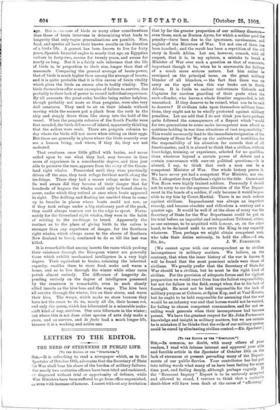LETTERS TO THE EDITOR.
THE NEED OF STERNNESS IN PUBLIC LIFE. pro THE EDITOII OF THE " SPEOTkT01.1 SIR,—It is refreshing to read a newspaper which, as in the Spectator of October 18th, advocates that the Secretary of State _or War shall bear his share of the burden of military failures. For nearly two centuries officers have been tried and cashiered, er disgraced without trial or opportunity of defence, while War Ministers have been suffered to go from office unpunished,
even with increase of honour. I assert without any hesitation
that by far the greater proportion of our military disasters-- even those, such as Buenos Ayres, for which a soldier paid the penalty—have been due to the ignorance, carelessness, and neglect of the Ministers of War. Yet not one of them has been touched ; and the result has been a repetition of the old story in South Africa. Let me, however, remark, with all respect, that it is, in my opinion, a mistake to break a Minister of War over such a question as that of remounts, important though it be, when he is answerable for failings of a much more serious nature. Let him rather be arraigned on the principal issue, on the great military blander of all blunders, — the fact that there was no army on the spot when this war broke out in South Africa. It is futile to cashier unfortunate Colonels and Captains for careless guarding of their posts when the arch-offender, who leaves a whole frontier unguarded, is left unscathed. If they deserve to be ruined, what can he be said to deserve ? If civilians take upon themselves military func- tions, they ought not to be wholly protected against military penalties. Let me add that I do not think you have perhaps quite followed the consequences of a Report which " would for two generations to come make incompetent men afraid to gontinue holding in war time situations of vast responsibility." This would necessarily lead to the immediate resignation of the Secretary of State for War on the outbreak of hostilities, for the responsibility of his situation far exceeds that of all functionaries; and it is absurd to think that a civilian, without knowledge, training, or experience, selected for no qualifica. tions whatever beyond a certain power of debate and a certain conversance with currant political questions,—it is absurd, I say, to think that such a man can be a competent Minister of War. Our whole history proves it. We have never yet had a competent War Minister, not one. No, I altogether deny Chatham's right to the title. Carnot and Von Roon were highly trained soldiers. Personally I should not be sorry to see the supreme direction of the War Depart- ment in the hands of a soldier, if only because it would be pos- sible to try him by Court-Martial. There is no such redress against civilians. Impeachment was always an imperfect remedy, and became obsolete and ridiculous a century and a quarter ago. It would be well if at the close of every war the Secretary of State for the War Department could be put on his trial before an impartial and independent Tribunal, either, as one extreme, to be acquitted with honour, or, on the other hand, to be declared unfit to serve the King in any capacity whatever. Then perhaps we might obtain competent men, who take their duties seriously, to hold the office.—I am, [We cannot agree with our correspondent as to civilian incompetence in military matters. We believe, on the contrary, that when the inner history of the war is known it will be found that the most prescient minds were those of civilians. We greatly prefer that the Secretary of State for War should be a civilian, but he must be the right kind of civilian. For the provision of adequate forces and for vigilant preparation we would exact from him the fullest responsibility, but not for failure in the field, except when due to his lack of foresight. He must not be held responsible for the lack of military purpose at Colenso, at Spion Kop, and at Vaal Krantz, but he ought to be held responsible for assuming that the war would be an infantry war and that horses would not be wanted, for failing to choose competent commanders, and for not re- calling weak generals when their incompetence had become patent. We have the greatest respect for Mr. John Fortescue s knowledge and insight in military matters, but we are certain he is mistaken if he thinks that the evils of our military system could be cured by eliminating civilian control—En. Spectator.]










































 Previous page
Previous page